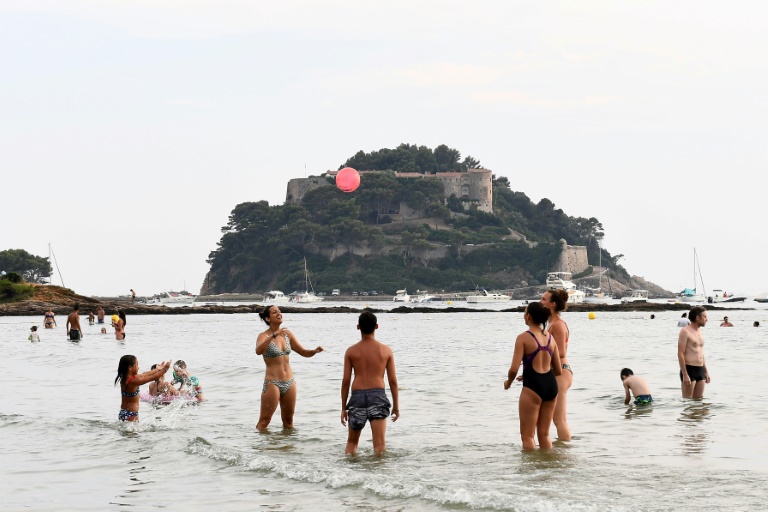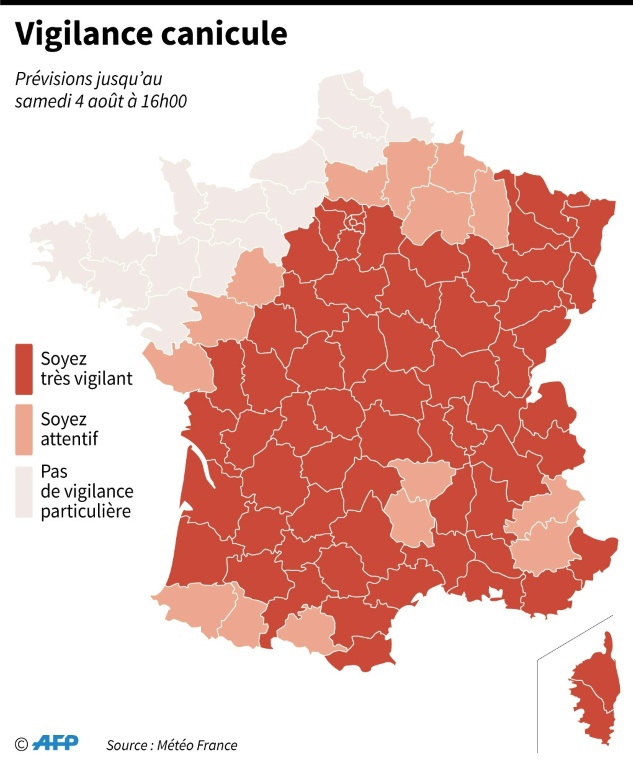Heatwave and Traffic Jams: Black Day on the Roads, a Record of 67 Departments on Alert

For this first weekend of August, prepare to suffocate and spend many hours in traffic jams if you go on vacation.
The day of Saturday looks very difficult on the roads of France, classified black, and leaded by a heat wave that stifles two thirds of the departments placed in orange vigilance , a record.
🔶 67 dpts en #vigilanceOrange
Restez informés sur https://t.co/rJ24zzmmy4 pic.twitter.com/iv9VKy92fw
— VigiMétéoFrance (@VigiMeteoFrance) 4 August 2018
Bison Futé foresees “extremely difficult” traffic conditions, in the sense of departures, due to the “crossover” of vacationers. It was recommended to leave the Île-de-France before 05H00 to avoid traffic jams, especially in the Rhone Valley, and between Poitiers and Bordeaux, or around the Mediterranean, from Narbonne to Marseille.
On Friday, on the A9, near Perpignan, the traffic was very disturbed by a truck accident. The highway was cut in both directions, with thousands of vehicles blocked. Some people had minor discomfort, according to firefighters.
Health Minister Agnès Buzyn has called for particular vigilance during this crossover, to protect children and to take water.
Warmth orange vigilance will affect a record number of 67 departments, and temperatures will remain very hot. Only the northwestern part of France is spared.
Meteo France added Friday Charente-Maritime to the 66 departments already in orange vigilance since Thursday, matching the record of June 21, 2017 where 67 departments were found on the card vigilance at the same time.
Maximum temperatures will be slightly higher than Friday in the Southeast. Elsewhere, they will be stationary even slightly lower. Thus, they will vary from 32 to 38 degrees on the southern half and 31 to 35 degrees on the northern half with 20 to 26 degrees on the Channel coast.
Friday was “one of the hottest days,” said forecaster Stéven Testelin. With temperatures of 35 ° C to 39 ° C over a large part of the country.
While the 40 ° C were reached this week for the first time this year, this bar was not exceeded Friday at 5pm, with a maximum temperature of 39.6 ° C recorded in the Gard, Montclus.
The heat should drop slightly Sunday, before a “second peak” Monday and Tuesday, but “we are far from the heat wave of 2003,” added Stéven Testelin. The summer of 2003 remains the hottest ever since 1950, with an exceptionally long heat wave of two weeks and a mercury exceeding 40 ° C in many resorts, including Brittany.
Shortage of fans
Fans, umbrellas, inflatable pools, mobile air conditioners … The French are trying to cool off, also taking refuge on the bathing places.
“Impossible to take my son to the park, in the apartment is the furnace … We must completely rethink the activities for children,” said Mathilda Jambin, 32, spreading her son screen total near the pool of his residence Toulouse.
“Sales are exploding. We restocked our stock Thursday, while it was held until the end of August, “says the manager of a sign in Strasbourg, which sells including fans.

Star Night this weekend
Faced with the situation, the Minister of Health is very present in the media. It wants to show the mobilization of the State to ward off the specter of catastrophes of 2003 and 2006, where heat waves had caused the death of several thousand people.
In the face of criticism, such as that of Patrick Pelloux, president of the Association of Emergency Physicians of France, who spoke of “a saturation of emergency services”, the government spokesman Benjamin Griveaux said Friday that he will not there was “no general tension in the emergency services”.
Corollary of this heat wave, an ozone pollution hit Friday several regions of the north, east and southeast, an episode that could continue Saturday in places, especially because of road traffic.
The heat wave also has economic impacts. The FNSEA is worried about the “worrying” situation of farmers, because of the drought that is causing water restrictions in several departments.
Because of the heat, EDF reduced the production of one unit of the Fessenheim nuclear power plant (Haut-Rhin) and stopped two reactors, one in the Saint-Alban (Isère) power plant and the other in the Bugey (Ain). In the construction industry, schedules are set up on certain sites.
Good news, however, for astronomy enthusiasts who were disappointed by a lunar eclipse last week by storms and rain. The sky will be clear this weekend for the 28th edition of “Nights of the stars” which Mars, closer to the Earth, will be the star.

Enjoyed this? Get the week’s top France stories
One email every Sunday. Unsubscribe anytime.


